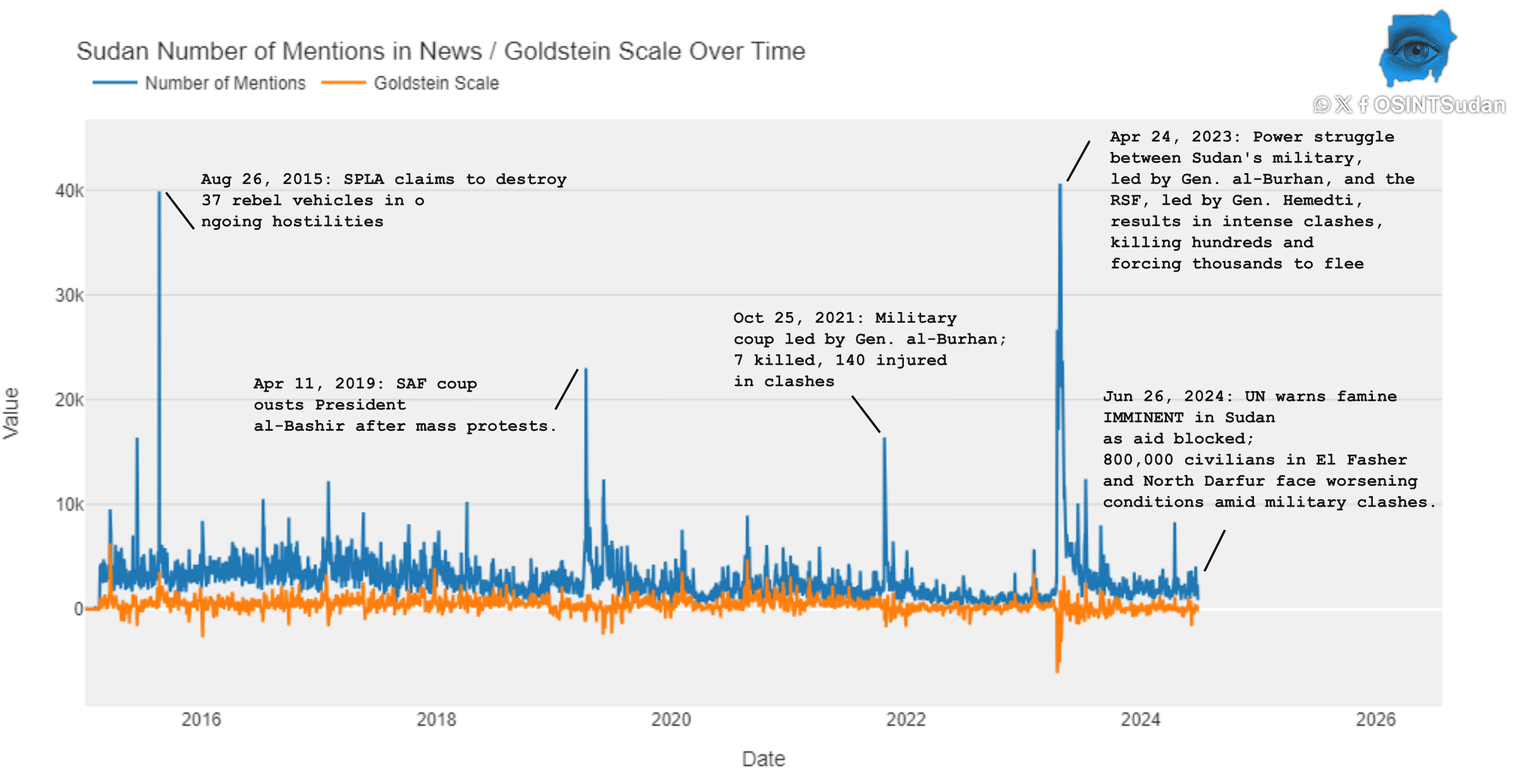Data-Driven Diplomacy
Open-Source Intelligence, Political Ontology and Big Data. Reassessing Sudan's Geopolitical Risks and Conflict Dynamics
Holistic Overview
The timeline below illustrates the total mentions of "Sudan" in major global news and articles from March 2015 to June 2024, alongside variations in the Goldstein Scale. This expert-based intensity ranking assesses CAMEO action code categories, ranging from −10.0 (highly conflictual) to +10.0 (highly cooperative), determined through big data analytics. Although any scoring scale can be debated, this approach ensures that any bias is explicitly preserved in the machine coding, allowing for recoding based on different viewpoints.

Data Source: The GDELT Project
Our analysis is based on comprehensive data sourced from the GDELT Project. This extensive dataset, amounting to nearly 2.5 terabytes, allows us to quantify and analyse the mentions of Sudan over time from major news outlets.
Developing New Risk Models
Our aim is to develop new models that recalibrate risk indicators using empirical observations and political ontology at a subnational level. These models are designed to better capture adverse geopolitical events and their associated risks in real time. Utilizing large language models (LLMs), this analysis centres on newspapers and articles that delve into geopolitical tensions, scrutinizing their evolution and economic ramifications by examining news coverage alongside fluctuations in the exchange rate between the Sudanese pound and the U.S. dollar.
Time Line of Events
On August 26, 2015, Sudan number of Mention in the news exemplified, ongoing hostilities amidst efforts to achieve lasting peace, highlighting in Relief Web Report
On April 11, 2019, BBC report a coup d’état took place in Sudan, when President Omar al-Bashir was overthrown by the Sudanese Armed Forces after popular protests demanded his departure. The army, led by Ahmed Awad Ibn Auf, toppled the government and National Legislature, and declared a state of emergency in the country for a period of three months, followed by a two-year transition period.
On October 25, 2021, Router reported, the Sudanese military seized power from the transitional government, leading to a significant event in Sudan’s recent history. The coup was led by General Abdel Fattah al-Burhan, and marked by violence, with at least seven people killed and over 140 injured in clashes between soldiers and street protesters.
On April 24, 2023, Human Right Watch reported a power struggle between Sudan’s military and the country’s main paramilitary force, the Rapid Support Forces (RSF), led to intense clashes, killing hundreds and sending thousands fleeing for safety.
Financial implications
By closely examining these incidents, we can gain a deeper understanding of how geopolitical tensions and conflict influence economic stability and currency exchange rates. These peaks illustrate the impact of geopolitical events on the Sudanese pound's value against the U.S. dollar.

As of June 26, 2024, the SDG/USD exchange rate was fluctuating between ~0.0017 and ~ 0.0020, indicating ongoing economic volatility. Higher geopolitical risk foreshadows lower investment, stock prices, and employment. Higher geopolitical risk is also associated with a higher probability of economic disasters and with larger downside risks to the global economy. The time line below show the sum of Sudan total mentioned numbers since March 2023 till June 26, 2024.

The recent slight shift to positive in the Goldstein conflict intensity scale suggests a high level of political negotiations, coupled with a normalization in conflict intensity, news, and information. Notably, the graph shows a steady decline in the number of mentions of Sudan, resembling a historical decline as seen in FIG.1.
Significantly, on April 16, 2023, mentions of Sudan reached an unprecedented peak of 40,000 in one day, the highest since 1920. This lagging indicator pin point to the severity of the current crisis, potentially marking it as one of the worst in Sudan's history.
Global Diplomacy and Economic Stability Dynamics
The analysis of CAMEO event codes reveals key dynamics in Sudan's interactions on the global stage. High mentions of visits and consultations indicate active diplomatic engagement, while significant reports of military force underscore ongoing conflicts and security challenges. Additionally, instances of praise highlight moments of positive recognition.
Diplomatic Activity:
The high mentions of visits (both making and hosting) and consultations indicate a robust level of diplomatic activity involving Sudan, suggesting ongoing efforts to engage with the international community.
Military Engagement:
The considerable mentions of the use of conventional military force point to ongoing conflicts and security issues, underscoring the need for stability and peace efforts.
Recognition:
Mentions of praise and endorsements show that despite the challenges, there are instances where Sudan has received positive recognition, which could be leveraged to build international support and partnerships.
To achieve a spatial distribution representation, we utilized NLP and AI for location text extraction, grouping the data at the administrative level 1. The final plot highlights the three key locations with the highest probability of conflict spilling over into neighbouring counties.
Recommendations
The International Food Policy Research Institute IFPR along with World Food Program WFP, recommend the following in The Food Security and Social Assistance in Sudan During Armed Conflict 2024 Report summaries key recommendations as follow:
Achieve Ceasefire: Stabilize agriculture and markets, enable humanitarian access, and facilitate the return of displaced persons.
Provide Humanitarian Assistance: Ensure timely delivery of aid and address needs in hard-to-reach areas.
Implement Nutritional Programs: Distribute nutrient-rich foods with a focus on rural households.
Enhance Agricultural Support: Aid smallholder farmers with seeds, fertilizers, and equipment.
Strengthen Market Access: Improve roads and market infrastructure.
Expand Social Protection: Increase food aid and cash transfers, particularly in high-conflict areas.
Support Community Resilience: Promote sustainable practices and local food initiatives.
Improve Data Collection: Refine methodologies to adapt to conflict dynamics.
OSINT Sudan’s Commitment
OSINT Sudan is committed to refining data collection and methodologies to adapt to evolving conflict dynamics. By leveraging advanced analytics and real-time data, we provide accurate insights for legal accountability, humanitarian needs, policymaking, and strategic asset protection. Our efforts aim to enhance food security, tackle disinformation, combat wildlife crimes, stabilize the economy, and foster resilience amidst geopolitical challenges.




